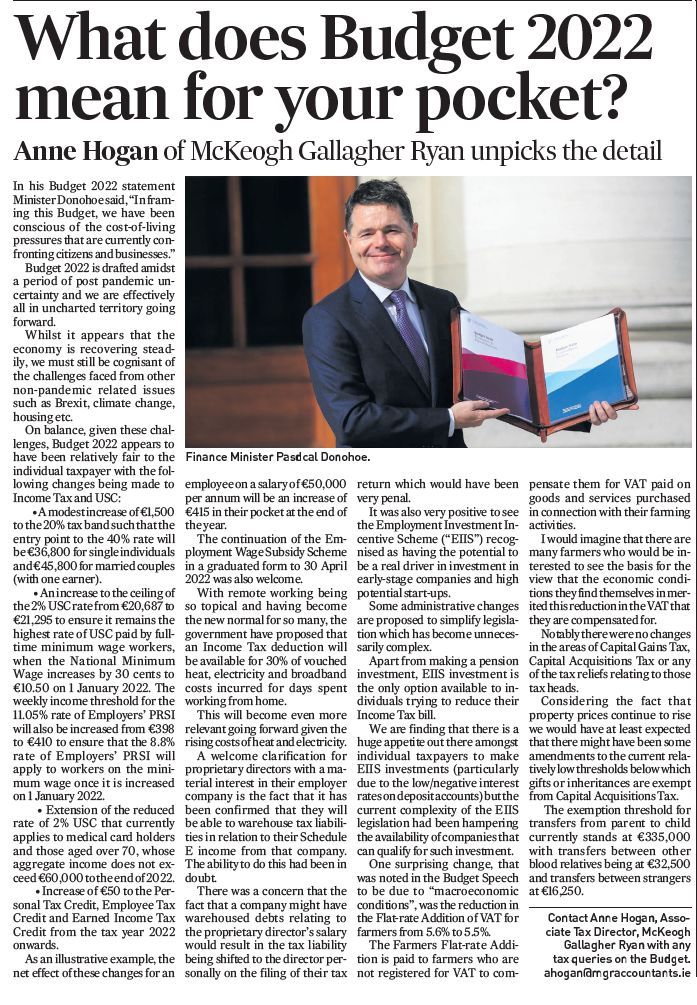 Our Tax Director Anne Hogan’s Clare Champion Article assessing Budget 2022 and what it means for the individual.
Our Tax Director Anne Hogan’s Clare Champion Article assessing Budget 2022 and what it means for the individual.
In his Budget 2022 statement Minister Donohoe said, “In framing this Budget, we have been conscious of the cost-of-living pressures that are currently confronting citizens and businesses.” Budget 2022 is drafted amidst a period of post pandemic uncertainty and we are effectively all in uncharted territory going forward. Whilst it appears that the economy is recovering steadily, we must still be cognisant of the challenges faced from other non-pandemic related issues such as Brexit, climate change, housing etc. On balance, given these challenges, Budget 2022 appears to have been relatively fair to the individual taxpayer with the following changes being made to Income Tax and USC:
- A modest increase of €1,500 to the 20% tax band such that the entry point to the 40% rate will be €36,800 for single individuals and €45,800 for married couples (with one earner).
- An increase to the ceiling of the 2% USC rate from €20,687 to €21,295 to ensure it remains the highest rate of USC paid by full-time minimum wage workers, when the National Minimum Wage increases by 30 cents to €10.50 on 1 January 2022. The weekly income threshold for the 11.05% rate of Employers’ PRSI will also be increased from €398 to €410 to ensure that the 8.8% rate of Employers’ PRSI will apply to workers on the minimum wage once it is increased on 1 January 2022.
- Extension of the reduced rate of 2% USC that currently applies to medical card holders and those aged over 70, whose aggregate income does not exceed €60,000 to the end of 2022.
- Increase of €50 to the Personal Tax Credit, Employee Tax Credit and Earned Income Tax Credit from the tax year 2022 onwards.
As an illustrative example, the net effect of these changes for an employee on a salary of €50,000 per annum will be an increase of €415 in their pocket at the end of the year.
The continuation of the Employment Wage Subsidy Scheme in a graduated form to 30 April 2022 was also welcome.
With remote working being so topical and having become the new normal for so many, the government have proposed that an Income Tax deduction will be available for 30% of vouched heat, electricity and broadband costs incurred for days spent working from home. This will become even more relevant going forward given the rising costs of heat and electricity.
A welcome clarification for proprietary directors with a material interest in their employer company is the fact that it has been confirmed that they will be able to warehouse tax liabilities in relation to their Schedule E income from that company. The ability to do this had been in doubt. There was a concern that the fact that a company might have warehoused debts relating to the proprietary director’s salary would result in the tax liability being shifted to the director personally on the filing of their tax return which would have been very penal.
It was also very positive to see the Employment Investment Incentive Scheme (“EIIS”) recognised as having the potential to be a real driver in investment in early-stage companies and high potential start-ups. Some administrative changes are proposed to simplify legislation which has become unnecessarily complex. Apart from making a pension investment, EIIS investment is the only option available to individuals trying to reduce their Income Tax bill. We are finding that there is a huge appetite out there amongst individual taxpayers to make EIIS investments (particularly due to the low/negative interest rates on deposit accounts) but the current complexity of the EIIS legislation had been hampering the availability of companies that can qualify for such investment.
One surprising change, that was noted in the Budget Speech to be due to “macroeconomic conditions”, was the reduction in the Flat-rate Addition of VAT for farmers from 5.6% to 5.5%. The Farmers Flat-rate Addition is paid to farmers who are not registered for VAT to compensate them for VAT paid on goods and services purchased in connection with their farming activities. I would imagine that there are many farmers who would be interested to see the basis for the view that the economic conditions they find themselves in merited this reduction in the VAT that they are compensated for.
Notably there were no changes in the areas of Capital Gains Tax, Capital Acquisitions Tax or any of the tax reliefs relating to those tax heads. Considering the fact that property prices continue to rise we would have at least expected that there might have been some amendments to the current relatively low thresholds below which gifts or inheritances are exempt from Capital Acquisitions Tax. The exemption threshold for transfers from parent to child currently stands at €335,000 with transfers between other blood relatives being at €32,500 and transfers between strangers at €16,250.
 Please do not hesitate to contact Anne Hogan, Associate Tax Director, McKeogh Gallagher Ryan with any tax queries on the Budget. ahogan@mgraccountants.ie
Please do not hesitate to contact Anne Hogan, Associate Tax Director, McKeogh Gallagher Ryan with any tax queries on the Budget. ahogan@mgraccountants.ie
